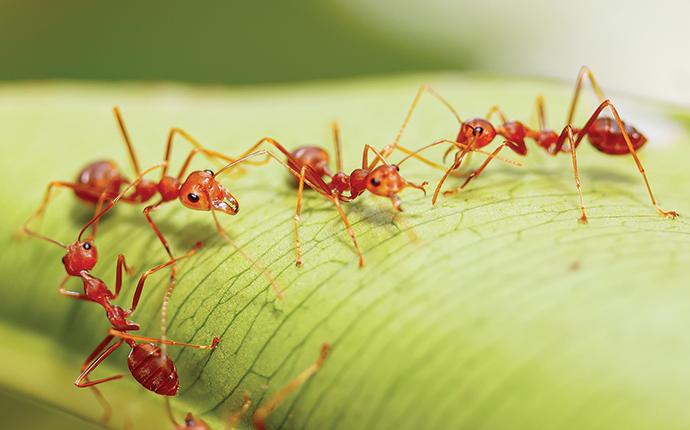Cause of Fire Ants in Your Yard
Ants of all types are always scavenging for food and are therefore attracted to leftover food in the house, yard, or trash cans. If you have a grill area, outdoor trash bin, or tend to eat meals on the back patio, you have a greater risk of attracting ants to your yard.
Aside from their unsightly mounds and fiery sting, fire ants can cause secondary issues to your lawn as well. Let’s take a look at what type of harm they can cause, as well as solutions for preventing them.
Damage done by fire ants in the garden
In the garden, fire ants can cause various problems. Despite being useful critters to the ecosystem, the damage they inflict in the garden can have major consequences for the health of your garden plants and/or lawn, such as:
- Sagging pavement due to underground soil damage (patio or driveway)
- Bald spots in the lawn
- Increased risk of aphids on garden plants
- Risk of you, your kids, and your pets getting bitten
Prevent damage to your garden plants or lawn by taking early measures to prevent fire ants in the garden by combating them responsibly.
How to Get Rid of Fire Ants Effectively in the Garden
Preventing Fire Ant Nuisance
Prevention is always better than a cure! You can prevent ants from nesting in your environment with these tips:
· Make sure food leftovers are covered
· Clean the garden table after dinner
· Wipe terrace tiles and pavement well
· Throw a bucket of detergent over the tiles every now and then
· Close waste containers properly and keep them clean (with detergent)
Killing Fire Ants by Herb Plants
There are several herbs that are effective in keeping ants away:
· Lavender
· Tansy
· Coin
· Rosemary
· Marjoram
· Nettle
· Sage
· Basil
You can place some pots at strategic points in the garden. An added benefit is that many of these are edible as well!
Vinegar to prevent fire ants
Spray the garden regularly with a water-vinegar mixture. You should assume a ratio of one part vinegar to five parts water. This dilution is not harmful to plants or animals, but will effectively deter fire ants without the use of abrasive chemicals.
Pepper at the entrance of fire ant nest
Another natural remedy is to sprinkle some pepper at the entrances of an ant nest. Ants don’t walk on pepper! This way you keep the ants in the nest, which will eventually starve them out.
Sprinkle coffee grounds
Throw coffee grounds in the garden in places you don’t want ants to reach. Again, this is safe and natural, and provides a cheap and simple deterrent..
Copper in the garden
Ants don’t walk over copper. So it can be very effective to tension a copper wire or place a copper coin on the walkway. This won’t eradicate them, of course, but it’s a great way to create a barrier around the deck, walkway, or garden bed.
Ant bait box
Of course you can also opt for the well-known ant bait box. You place the bait box in the garden. The ants are lured to the box, ingest the poison, and will slowly die off.
The bait boxes should be replaced after four weeks. As always, use special care with children and pets.
How to get rid of the whole nest
If you’ve found the nest in your yard, there are 3 effective ways to get rid of them completely.
The first is to spray a commercially available pesticide on the nest. They come in spray bottles that are sold at home improvement or gardening stores. This method is usually immediately effective.
The second method is to pour boiling water over the nest. Insects such as ants are sensitive to heat, so you can get rid of them immediately by pouring hot water on them. If you are worried about the effects of chemicals near plants, it is safer to use boiling water.
The third option is to hire a professional. Full pest eradication will be at your fingertips. A landscaping company can efficiently treat fire ants, fleas, and ticks the right way.
How to get rid of fire ants around plants such as flower beds
If you can’t see the nest, but there are a lot of ants near plants such as flower beds, you may want to use a spray-type or stationary agent.
There is generally some helpful information on the back of the product that indicates whether or not they have any effect on plants, so you can determine where it is or isn’t harmful to use a particular product.
Precautions for Eradication
Be careful of the temperature when pouring hot water!
This method will not be effective unless the water is actually boiling, and you’re using enough to penetrate the entire nest. There are several tunnels and caverns beneath the visible mound, meaning the next is much bigger than you think it is!
This means we are using a LOT of very very hot water, which requires utmost caution! This may be one you enlist some help with, and be sore no kids or pets are underfoot as you transport the water to the yard. .
When using chemicals, check if they affect the plants!
There are a variety of ant control agents on the market. There are spray type, stationary type, liquid type, etc., but when using it in the garden, make sure that it does not affect the plants.
Also, if you have pets in the yard or small children playing, chemical pesticides can pose a risk of poison. In this event, it is sometimes safer to use something edible, such as coffee grounds, vinegar solution, or even cornmeal.







